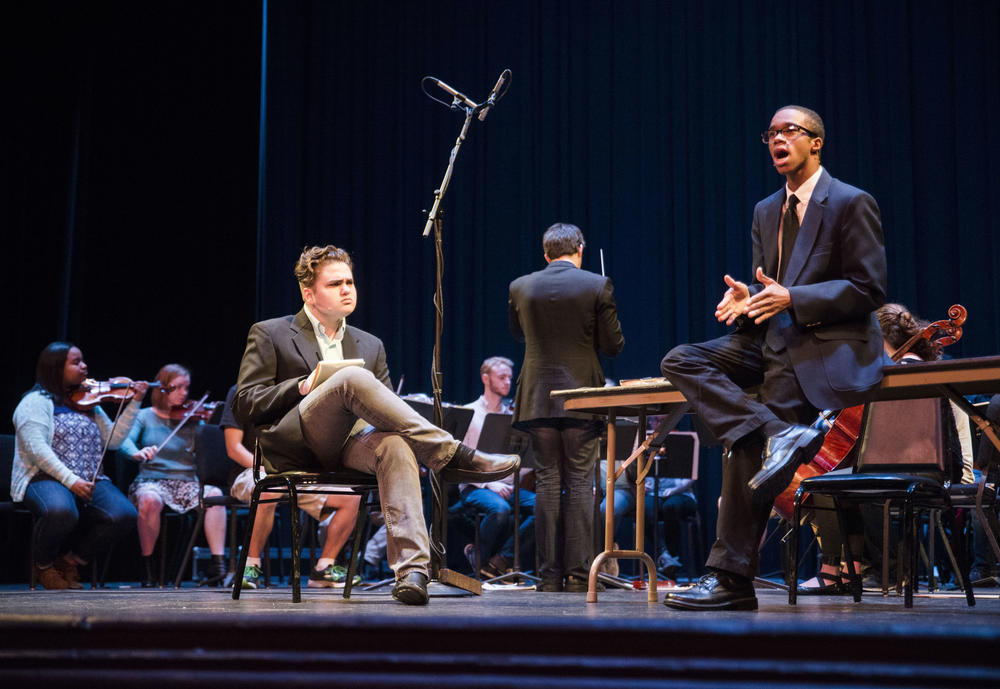Section Branding
Header Content
A New Eye On One City's Life With Race
Primary Content
Hear playwright Mark Mobley and a rehearsal of What Color Is Your Brother?
For Southerners who have lived and struggled with the issue of race all their lives, it can be tough to see it with fresh eyes.
Sometimes you need an outsider. When it comes to race in one Southern city, Macon, Ga., playwright Mark Mobley is just that.
The play “What Color Is Your Brother?” is the product of Mobley taking his outsider's view into conversations with Macon locals on the issue of race. The project grew out of Mobley's longtime friendship with a Macon native, renown violinist Robert McDuffie.
In recent years, McDuffie has been collaborating with actress Anna Deveare Smith on a series of performances win which Smith reads famous texts of the Civil Rights Movement, think Letter from the Birmingham Jail, to McDuffie’s accompaniment. McDuffie wanted to created something like that closer to home.
“Race is a problem everywhere but it has particular... there are particular issues here that he wanted to address,” Mobley said.
Mobley said McDuffie came to him because of Mobley’s reporting background. The two were drawn together years ago after Mobley wrote what McDuffie remembers as a pretty tough review. When it came time to write the piece, Mobley went straight to reporting.
Mobley talked to Macon citizens in one on one interviews about race. His sources were politicians and ministers, even the county coroner.
“Everything in the play is either something spoken to me or by me to someone I'm interviewing,” Mobley said.
Music performed by students in the McDuffie Center for Strings at Mercer University is the backdrop for those words. The actors are teenagers and kids, a strategy aimed at literally putting a fresh face on the words of people many in the community have known their whole lives.
As a point on the map to talk about race, Macon, presented a particular problem.
“There are a lot of cities and towns that when you say the name of the city or town there's instantly a racial incident that is connected,” Mobley said, “In terms of racial strife, aside from the things that affect every community, there's not a Macon race riot to point to or a particular march.”
Without that focal point, Mobley said he was left with one option.
“It's meant diving in and talking to people,” Mobley said.
Once he did that, he did find what he says are Macon’s signal moments in struggling with race.
“It had its transformative event, which was segregation and the integration of the schools and the and the founding of all these white private schools in the suburbs,” he said before giving it a simple name.
“White flight,” he said.
The other event that still reverberated was the construction of Interstate 75. That highway bisected what had until then been the neighborhood that the black middle and professional class called home in Macon.
Mobley said that as far as he can tell, the city has yet to recover from either event.
“It just completely changed the nature of the community,” he said.
So how does a community recover?
“I think people are still trying to figure that out,” he said.
One interview subject tackled the lingering community wide segregation head on.
“One of the characters in the play says ‘You know if you live in north Macon, if you're white and live in north Macon, you don't have to go downtown for anything unless you work downtown or you really want to go’,” Mobley said. “I mean you've got you've got your mall you've got your schools ... everything is there for you. You can have your entire life.”
Mobley says that fine, but you have to know what you are losing in the process.
“That just means that there's a built in separation between the people,” he said.
Mobley said he came away from writing the play with an expanded idea of what community success means.
“Success isn't just building a new highrise downtown or you know some some sort of big civic project like that, he said. “Success is actually helping save lives... tamping down crime and making livable communities.”
Mark Mobley said he hopes work like his can open up a way forward.
“What Color Is Your Brother?” will be performed at 7:30pm at the Grand Opera House in Macon. Tickets are free.
Support for Health, Education, and Poverty reporting on GPB Macon comes from the Peyton Anderson Foundation.



